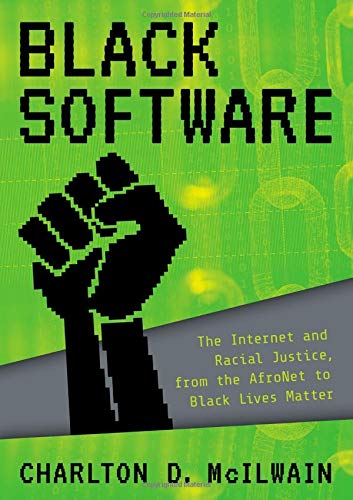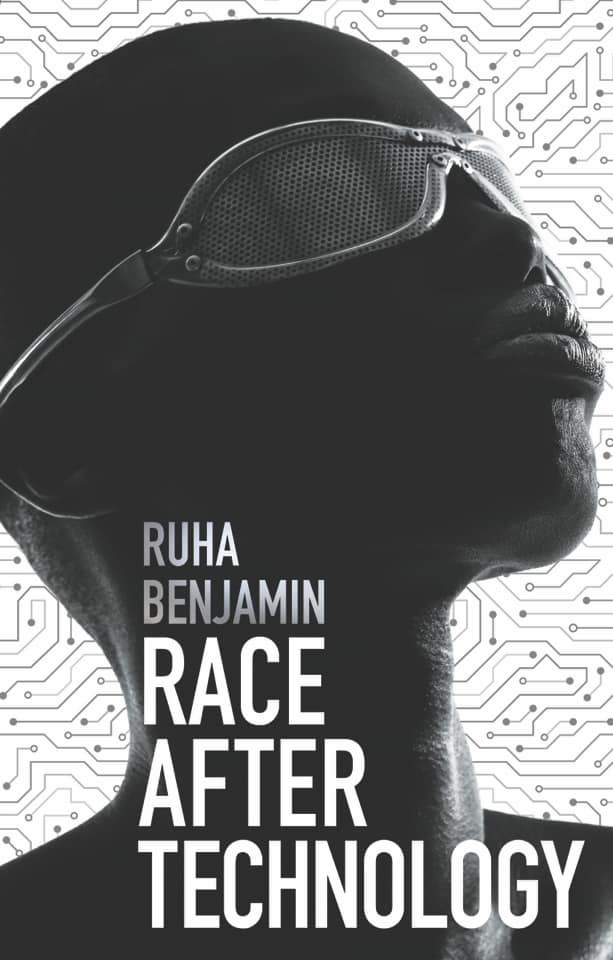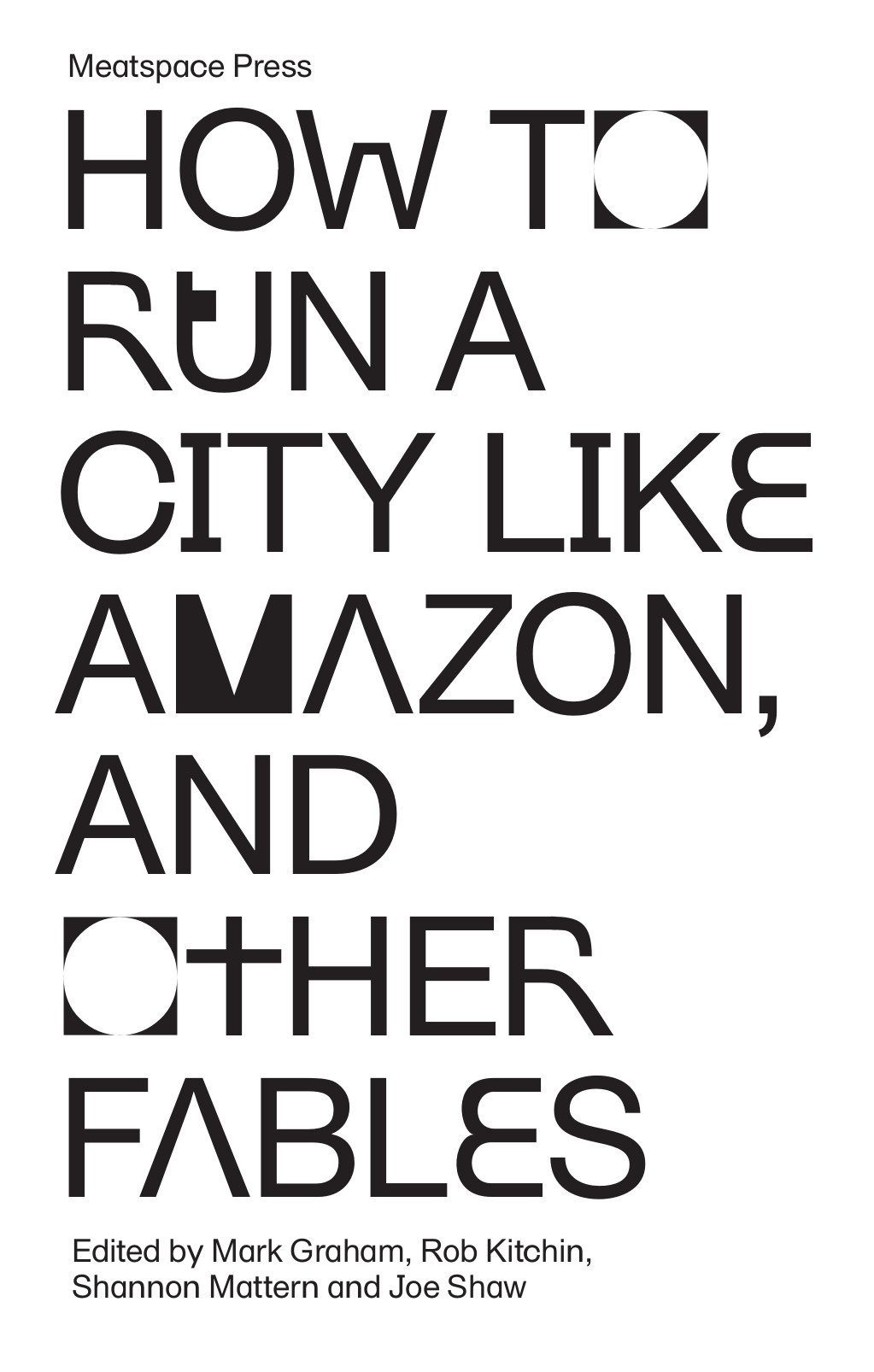Charlton D. McIlwain: Black Software: The Internet and Racial Justice, from the AfroNet to Black Lives Matter (2020)
Filed under book | Tags: · activism, afronet, black people, computing, history of computing, history of technology, internet, race, racism, technology

“Activists, pundits, politicians, and the press frequently proclaim today’s digitally mediated racial justice activism the new civil rights movement. As Charlton D. McIlwain shows in this book, the story of racial justice movement organizing online is much longer and varied than most people know. In fact, it spans nearly five decades and involves a varied group of engineers, entrepreneurs, hobbyists, journalists, and activists. But this is a history that is virtually unknown even in our current age of Google, Facebook, Twitter, and Black Lives Matter.
Beginning with the simultaneous rise of civil rights and computer revolutions in the 1960s, McIlwain, for the first time, chronicles the long relationship between African Americans, computing technology, and the Internet. In turn, he argues that the forgotten figures who worked to make black politics central to the Internet’s birth and evolution paved the way for today’s explosion of racial justice activism. From the 1960s to present, the book examines how computing technology has been used to neutralize the threat that black people pose to the existing racial order, but also how black people seized these new computing tools to build community, wealth, and wage a war for racial justice.
Through archival sources and the voices of many of those who lived and made this history, Black Software centralizes African Americans’ role in the Internet’s creation and evolution, illuminating both the limits and possibilities for using digital technology to push for racial justice in the United States and across the globe.”
Publisher Oxford University Press, 2020
ISBN 9780190863845, 0190863846
xi+296 pages
Video interview with author (Morning Joe, MSNBC, 2019).
Podcast interview with author (The Human and the Machine, 2019).
Reviews: Lori Emerson (LA Review of Books, 2021), Brian Alleyne (Computational Culture, 2021).
PDF (7 MB)
Comment (0)Ruha Benjamin: Race After Technology: Abolitionist Tools for the New Jim Code (2019)
Filed under book | Tags: · abolitionism, algorithm, artificial intelligence, dna, facebook, google, prediction market, race, racism, segregation, social media, surveillance, technology

“From everyday apps to complex algorithms, Ruha Benjamin cuts through tech-industry hype to understand how emerging technologies can reinforce White supremacy and deepen social inequity.
Benjamin argues that automation, far from being a sinister story of racist programmers scheming on the dark web, has the potential to hide, speed up, and deepen discrimination while appearing neutral and even benevolent when compared to the racism of a previous era. Presenting the concept of the “New Jim Code,” she shows how a range of discriminatory designs encode inequity by explicitly amplifying racial hierarchies; by ignoring but thereby replicating social divisions; or by aiming to fix racial bias but ultimately doing quite the opposite. Moreover, she makes a compelling case for race itself as a kind of technology, designed to stratify and sanctify social injustice in the architecture of everyday life.
This illuminating guide provides conceptual tools for decoding tech promises with sociologically informed skepticism. In doing so, it challenges us to question not only the technologies we are sold but also the ones we ourselves manufacture.”
Publisher Polity Press, Cambridge, 2019
ISBN 9781509526406, 1509526404
x+285 pages
Interview with author (Sanjana Varghese, Guardian, 2019)
Comment (0)How to Run a City Like Amazon, and Other Fables (2019)
Filed under book | Tags: · city, entrepreneurship, governance, management, platform, technology, urbanism

“Should cities be run like businesses? Should city services and infrastructure be run by businesses?
For some urban commentators, policy-makers, politicians and corporate lobby groups, the answer is ‘yes’ to both questions. Others are critical of such views, cautious about shifting the culture of city administration from management to entrepreneurship, and transforming public assets and services run for the common good into markets run for profit.
The stories and essays in this book explore how a city might look, feel and function if the business models, practices and technologies of 38 different companies were applied to the running of cities. They ask: what would it be like to live in a city administered using the business model of Amazon (or Apple, IKEA, Pornhub, Spotify, Tinder, Uber, etc.) or a city where critical public services are delivered by these companies?
Collectively, the chapters ask us to imagine and reflect on what kind of cities we want to live in and how they should be managed and governed.”
Contributors: Manuel B. Aalbers, Tooran Alizadeh, James Ash, Sarah Barns, Gavin Brown, Ryan Burns, Matthew Claudel, Jeremy W. Crampton, Ayona Datta, Martin Dodge, Leighton Evans, Jessica Foley, Jennifer Gabrys, Mark Graham, Tony H. Grubesic, Edward Helderop, Kara C. Hoover, Andrew Iliadis, Kurt Iveson, Glenn Kaufmann, Rob Kitchin, Agnieszka Leszczynski, Sophia Maalsen, Shannon Mattern, Harvey J. Miller, Cian O’Callaghan, Nancy Odendaal, Dietmar Offenhuber, Alison Powell, Lizzie Richardson, Gillian Rose, Jathan Sadowski, Kalpana Shankar, Joe Shaw, Harrison Smith, Monica Stephens, Linnet Taylor, Jim Thatcher, Pip Thornton, Anthony Vanky, Alberto Vanolo, Alan Wiig, Katharine Willis, Matthew Zook.
Edited by Mark Graham, Rob Kitchin, Shannon Mattern, and Joe Shaw
Publisher Meatspace Press, London, Oct 2019
Creative Commons BY-NC-SA License
ISBN 9780995577671
1357 paragraphs
Review: Jeremy Williams (Int’l J Urban & Regional Research, 2020).
Comment (0)
